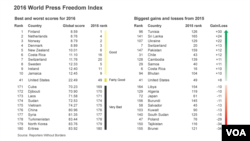There has been a "deep and disturbing decline" in respect for media freedom at levels both regional and global, the media rights group Reporters Without Borders said in its annual report.
The 2016 World Press Freedom Index, released by the group Wednesday, said the world is entering a "new era of propaganda" and a reluctance to engage in free debate.
The group said many world leaders have developed "paranoia" about journalists and are cracking down on the media, while privately owned media outlets are increasingly under pressure from corporate interests.
"The climate of fear results in a growing aversion to debate and pluralism,'' said Christophe Deloire, secretary-general of the Paris-based Reporters Without Borders.
"All of the indicators show a deterioration. Numerous authorities are trying to regain control of their countries, fearing overly open public debate," Deloire said.
He said new technologies allow leaders to appeal directly to the public, “so there is a greater degree of violence against those who represent independent information.”
"We are entering a new era of propaganda where new technologies allow the low-cost dissemination of their own communication, their information, as dictated. On the other side, journalists are the ones who get in the way,” Deloire added.
• Reporters Without Borders said the situation is particularly grave in Latin America and cited institutional violence in Venezuela and Ecuador, organized crime in Honduras, impunity in Colombia, corruption in Brazil and media concentration in Argentina.
• Eritrea was ranked the worst worldwide – 180th out of 180 -- in overall media freedom, falling below Syria, China and North Korea.
• Finland was ranked No. 1 -- for the sixth year in a row -- followed by the Netherlands and Norway.
• The U.S. ranked No. 41 in the report, with the report citing cybersurveillance as a major problem.
• Individual countries that rose most in the 2016 report include Tunisia -- to No. 30 from No. 96 – due to a decline in violence and legal proceedings, and Ukraine – to No. 22 from No. 107 -- because the conflict in the east of the country has abated.
• Individual countries that fell the furthest include Poland, to No. 47 from No. 29; Tajikistan, to No. 150 from No. 116; Brunei, to No. 155 from No. 121; and Burundi, to No. 156 from No. 145.
• The report attributed the declines to a rise in the authoritarian nature of some governments, such as those in Tajikistan, Egypt and Turkey; security situations that have become more dangerous, such as in Libya, Yemen and Burundi; blasphemy laws, such as in Brunei, and tighter government control of state-owned media, such as Poland.
• By region, Europe still has the freest media, followed by Africa, the Americas, Asia and Eastern Europe/Central Asia. North Africa/Middle East is still the region where journalists are most subjected to constraints of every kind.
Self-censorship
The effect of these obstacles to press freedom is self-censorship, Reporters Without Borders said.
The group also noted that media freedom is damaged by governments that are quick to suspend Internet access to their citizens.
The report said every continent has seen a decline in media freedom over the past three years.
The index measures indicators such as media independence, self-censorship, the rule of law, transparency and the safety of journalists in 180 countries.
Information for the study is based on questionnaires in 20 languages filled out by experts around the world as well as on quantitative data on abuses and acts of violence perpetrated against reporters.







